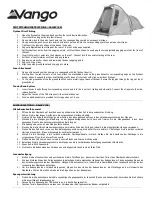
SPECIFICATIONS:
6 persons
Floor size:
12’ x 7’ (3.6 x 2.1m)
Centre
height:
5’5”
(1.6
m)
Weight:
18 lbs 4 oz (8.27 kg)
A
2
B
KEY
NO.
MODEL NO. CTC161207-1 (076-5451-6)
QTY.
REQ.
DESCRIPTION
Fibreglass Pole - Main
HFP11-576f
2
1
1
HFP8.5-405f
HFP6.3 -207t
HTFCTC161207-1
Fibreglass Pole - Side
Fibreglass Pole - Fly
Replacement Fly
1
HTDCT161207-1
Divider
14
HMS4-7
Tent Stakes - Metal
PART NO.
REPLACEMENT PARTS
C
CTC 161207-1 08/15
A
C
B
B
A
TROUBLESHOOTING GUIDE
PROBLEM
1. CONDENSATION
2. SEAM LEAKAGE
3. MILDEW
4. REPAIRING A TEAR
5. FAULTY ZIPPER
6. FADING FABRIC
7. FLOOR CONDENSATION
8. USE OF STAKES
SOLUTION
Condensation occurs when warm, moist air inside tent comes in contact with cooler outside air. Avoid touching walls to reduce contact leakage. Venting doors and
windows will reduce condensation. Store wet clothing outside of tent. A battery-powered fan may be helpful. Not applicable to screen houses.
Apply a generous amount of seam-sealer on inside seams. Seam-sealer may be purchased at any local sporting goods store.
To avoid mildew, store tent/screen house ONLY when thoroughly dry. However, if mildew occurs use a soft-bristle brush or sponge with mild dishwashing soap or Fels
Naptha soap to clean. Let dry thoroughly and a tent-approved water-repellent compound may be applied.
For small tears use a self-adhesive patch kit. We recommend a canvas or awning repair shop for larger tears.
Zippers are self-repairing. If the zipper separates, you can move the slider to the beginning of the zipper tape and rework the zipper.
Do not leave up in direct sunlight longer than necessary. If left in sunlight for prolonged periods of time, fabric will fade and weaken.
A ground cloth under the floor helps prolong its life, provides additional insulation and moisture protection. The cloth should be smaller than the floor to prevent rain
from running under the tent. Not applicable to screen houses.
Stakes should be installed at a 45 angle using a hammer or mallet. Stake loops should be kept taut without over-stretching fabric or webbing. This could cause tears or
leakage. To remove safely, use a hammer or stake puller. Do not remove by pulling on the fabric.
o






















